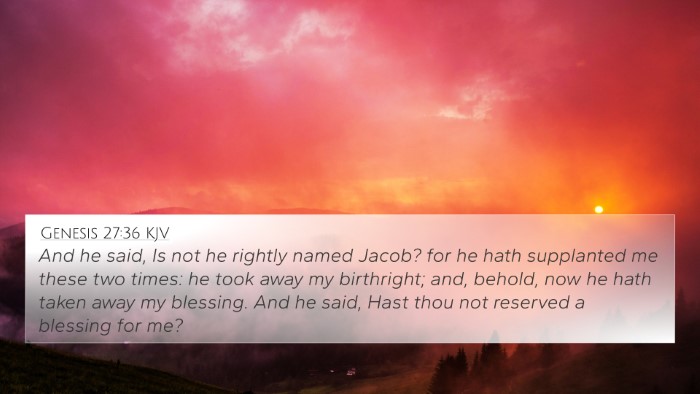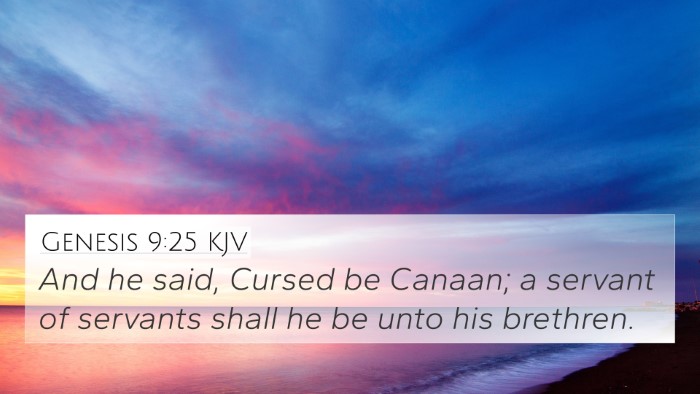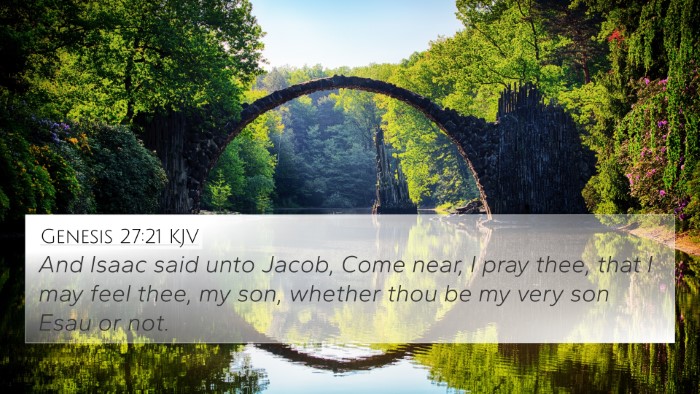Understanding Genesis 27:12
Genesis 27:12 states:
"Perhaps my father will feel me, and I shall seem to him to be deceiving him, and I shall bring upon myself a curse and not a blessing."
Context Overview
This verse is situated within the narrative of Jacob's deception of his father Isaac. The circumstances involve Jacob, encouraged by his mother Rebekah, preparing to receive the blessing intended for his brother Esau. Understanding the implications of Jacob's actions deserves careful scrutiny considering the broader themes of blessing, identity, and family dynamics.
Biblical Commentary Insights
- Matthew Henry: Henry observes that Jacob's fear indicates his awareness of the gravity of his actions. He expresses concern over the possibility of receiving a curse instead of a blessing, highlighting the importance of intention and the moral compass guiding one's actions. This foreshadows the complex relationships within the family and God’s sovereign plan even amidst human deception.
- Albert Barnes: Barnes comments on the psychological state of Jacob, recognizing his internal conflict. He interprets Jacob’s worry as a moment of moral reflection. It underscores the belief that blessings are a serious matter, not merely transactional. His awareness of the potential consequences emphasizes the depth of family relationships intertwined with spiritual significance.
- Adam Clarke: Clarke elaborates on the significance of this moment within the Jacob-Esau narrative. He points out that Jacob's fear reveals his understanding of the blessings associated with the patriarchs. Moreover, upwardly analyzing the family dynamics, Clarke suggests that this account serves as a foundation for broader themes of divine right and fulfillment of God’s promises, as seen through the lineage of Israel.
Thematic Connections
This verse serves as a point of intersection for various themes in Scripture, particularly around identity, legacy, deception, and divine providence. The narrative encapsulates relational tensions and the human tendency towards self-promotion at the cost of integrity.
Cross-References
The following Bible verses provide deeper insight and thematic connections related to Genesis 27:12:
- Genesis 25:29-34: The exchange of Esau's birthright, setting the stage for the struggle over blessings.
- Genesis 27:1-4: Isaac's intent to bless Esau reflects the familial expectations and preferences.
- Genesis 37:35: Jacob's future grief serves as a parallel of deception impacting the family dynamically.
- Jacob's Ladder - Genesis 28:12-15: Highlights God's personal revelation to Jacob, further indicating divine approval despite human failing.
- Hebrews 11:20: Reference to Isaac blessing Jacob, which legitimizes God's sovereign will through flawed motives.
- Romans 9:10-13: Paul's commentary on God's choice of Jacob over Esau reflects on the divine purpose behind these familial conflicts.
- Genesis 31:41-42: Jacob's later reflections on his past emphasize the tumultuous dynamics and God's protection over him.
Application and Reflection
Genesis 27:12 provides rich material for contemplation regarding the nature of blessings and the lengths we may go to secure our future. It’s an invitation to reflect on how we pursue our desires, acknowledge the implications of our actions, and trust in divine providence, even when our human nature leads us astray.
Tools for Cross-Referencing Biblical Texts
For those interested in delving deeper into the connections within Scripture, there are several tools and methods for conducting cross-referencing:
- Utilizing a Bible concordance to identify key themes and terms across verses.
- Engaging with a Bible cross-reference guide to follow verse parallels and contrasts.
- Exploring a cross-reference Bible study to facilitate discussion around linked Scriptures.
- Employing a Bible reference resource to discover themed connections that may enrich personal study.
Final Thoughts
In Genesis 27:12, we not only observe a pivotal moment in the narrative of Jacob but also partake in a transformative lesson on blessings and authenticity. The thematic connectivity to other verses serves to guide believers in understanding the intricate weaving of God's purpose and human endeavor.












